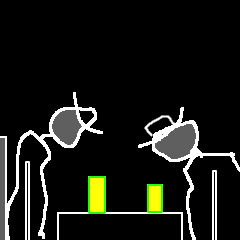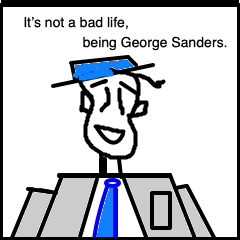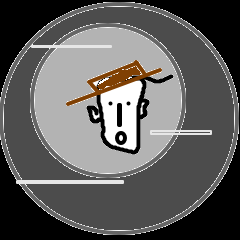|
A hand-painted signifier on the lintel, faintly illuminated by a stained fixture in the wall above it, read
"The D.B. Club"
"This isn't the right place," said Milford.
"Yes, but it's a place," said Addison.
"Any place is a place," said Milford.
"Your point is well taken," said Addison, taking out his Chesterfields, "but by 'place' I mean it's not the maze of dimly lit or completely dark corridors in which we have just been wandering these past thirty minutes."
"Let's go."
"Wait. Let's go in here, and maybe they can tell us how to get back to the Negro bar and to our lady friends."
"I don't know –"
"What do we have to lose?"
"Our sanity?"
"My dear chap," said Addison, "how can we lose something we do not possess?"
"Look how dirty this door is," said Milford.
It was true. The door was coated with cracked and peeling paint which might once have been a bright Kelly green, but was now reminiscent of nothing less than dried vomit.
"A lot of these venerable old establishments have unprepossessing exteriors."
"What's that little sign say?"
Milford referred to a small placard on the door, on which cursive words had been painted on a grey background. The words were barely legible in the dim light, but the two companions stepped closer to decipher them, which were
If you be the person all deride
as an example of idiocy,
and not without good reason,
turn the knob and come inside
to where douchebaggery
is always in season.
"Well," said Addison, having lighted a cigarette and tossed the match to the floor, "if that isn't an invitation I don't know what is."
There was knob on the door, and he turned it.
"Wait," said Milford.
"For what?"
"Maybe we really should just keep walking, and look for that other place –"
"My dear Milford, what's the worst that can happen if we just go inside and inquire for directions?"
Milford in the space of three seconds thought of several possibilities, each worse than the one previous, but he left these misgivings unvoiced, and, sighing, for the twelve-thousandth and thirty-third time since he had last been unconscious, he said simply, "All right. Open the door."
Inside of course was a bar, another bar, another crowded smoky bar that seemed to extend to infinity, and blaring jukebox music and the humming and babble of voices enveloped our friends like a wave eternally crashing.
There was a man sitting at a podium to the right of the entrance.
"Hi there, fellas," said the man. His face was the color of an old potato sack, and he wore a faded brown suit and a dull red bowtie. His hair was thin and strangely black. He had horn-rimmed glasses that magnified his eyes, which looked like the eyes of a dead octopus. "First time here, huh?"
"Yes," said Addison.
"So you're interested in membership."
"Well, actually," said Addison, "we were –"
"You two young fellas look like just the sort of guys we're looking for. And just between you and me and the wall we could use some new blood in this joint, ha ha."
"Well, really," said Addison, "we just stopped in to ask –"
"Allow me if I may, as part of our screening process, to ask you two good gentlemen a few questions."
"Um, excuse me –" said Milford.
"You," said the potato-sack man, to Milford, "judging by your peacoat, your newsboy's cap, the round Trotskyite spectacles, the Hemingwayesque fisherman's sweater –" he leaned over the edge of the podium to take in the lower part of Milford's corporeal host, "the dungarees and the scuffed workman's brogans, I'm going to say you're a poet. Am I right?"
Milford hung his head, and said nothing.
"Ha ha, I'm right," said the man. "And you, sir," he said, addressing Addison,
"the baggy colorless old suit and crumpled fedora that a maiden aunt probably bought for you when first you went off to an inglorious and disgracefully truncated college career, the general air of ill-fed dissipation, you, my good man, are obviously a novelist."
"Bingo," said Addison. "Now, as I was saying–"
"So far so good," said the man. "Now, the million dollar question. Have either of you published?"
He looked from Addison to Milford, and then back to Addison.
"Well, uh –" said Addison, "the thing is, I'm still rather in the beginning stages of working on my novel, which I envision as a true American epic in the tradition of –"
"I thought so," said the man. "How about you, buddy?" he said, cocking his head at Milford. "Any poems in small fly-by-night literary quarterlies?"
"Well, I haven't really submitted much yet thus far," said Milford.
"I'll take that as a no, then," said the man. "Okay, you're both accepted, provisionally, as members of 'the club'."
"Great," said Addison. "So, as I was saying–"
"That'll be a buck apiece. Oh, and I'll also need your names or at least your noms de plume for our official roster."
"Look," said Addison, "we appreciate it, I think I speak for my friend here, but we actually just just came in here to ask for directions."
"Yeah, sure, that's what they all say," said the man. "Listen pal, don't try to bullshit a bullshitter. You know you're a douchebag and I know you're douchebag, and we both sure as hell know your little pal here is a douchebag, and that's why you're both here. Welcome to the Douchebag Club, and like I said, that'll be a buck apiece."
"Wait a minute," said Milford. "We don't want to join your club."
"You telling me you and your boyfriend here ain't douchebags?"
"I'm not saying anything of the sort, I'm only saying we don't want to join your club."
"Yes," added Addison, "and if you would have only had allowed me to finish a sentence –"
"Oh, wow," said the man.
"What do you mean, 'Wow,'" said Addison.
"I mean, 'Wow, you two really are a couple of douchebags, aren't you?' I mean, even by my standards, which, believe me, are quite liberal, that's how long I been working here, you two really are a pair of prime douchebags."
An enormous fat man came over, holding an enormous cigar.
"We got a problem here, Cerberus?"
"Just a couple of real prime douchebags," said the man at the podium.
The big fat man took a look at our two friends.
"They sure look like prime douchebags." He had an English accent, but it might have been an affected one. "So what's the trouble, fellows?"
"We only came in here to ask for directions," said Milford.
"Bullshit," said the man at the podium.
"Be cool, Cerberus," said the big fat man, and he took the measure again of the two friends.
"They call me Big Daddy," said the big man. "And I know a couple of fellow prime douchebags when I see 'em. What are your names, chums?"
"Well, they call me Addison," said Addison, "but my real name is –"
"Pleased to meet you, Addison," said the big man. "Put 'er there."
He extended his enormous fat hand, like the paw of a rhinoceros.
Addison was unable by constitution to refuse a handshake, and so he allowed his thin hand to be enveloped in the fat man's fat hand, which squeezed his own just up to the point of pain, but then allowed it to escape.
"And you," said the big man called Big Daddy to Milford. "What's your moniker, young fella?"
"Milford?" said Milford.
"You don't sound too sure."
"It's Milford."
"And may I take your lily-white hand in a firm grasp of potential friendship, Milford, if that is indeed your name?"
"Please don't crush it."
"I'll try not to."
Milford extended his small hand and in turn allowed it to be swallowed up in the man called Big Daddy's paw,
and at the very verge of screaming in agony, his small hand was allowed to be pulled away.
"Follow me, gentlemen," said the big man called Big Daddy.
"But," said Addison.
"Yes, but," said Milford.
"We just want directions," said Addison.
"Yes," said Milford.
"I will give you directions," said the big man, "if that's what you want. I will give you very detailed directions. I'll give you directions to any place you want to go. I will even draw you a map. If that's what you want. Now come with me."
"They didn't pay their membership fees yet," said the man at the podium.
"Don't worry about that now," said the man called Big Daddy.
"I'm sure they're good for it."
"Look, I think we're just going to leave," said Addison. "Thanks anyway."
"Yeah, thanks," said Milford, and he turned around, went to the door and turned the doorknob.
The door wouldn't open.
|
































































